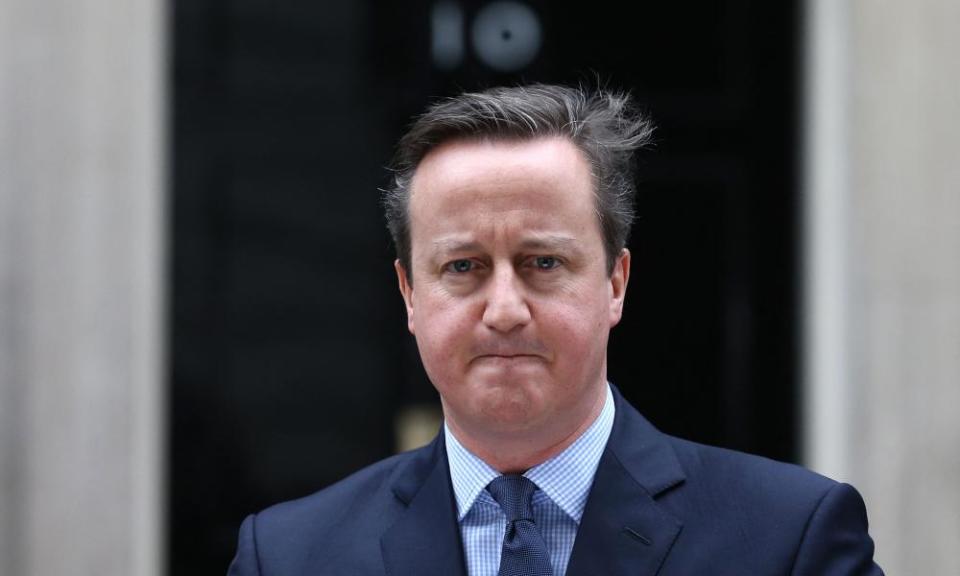Greensill inquiry is attempt to deflect blame from ministers – Whitehall union

An inquiry into lobbying launched by Boris Johnson is an attempt to deflect attention from the role of ministers in the Greensill scandal, the head of the senior civil servants’ union has said.
Dave Penman, the general secretary of the FDA, told the Guardian that the investigation has no specific remit to examine whether four ministers contacted by David Cameron as he lobbied on behalf of his employer, Greensill, acted within the rules.
The chancellor, Rishi Sunak, the Treasury ministers Jesse Norman and John Glen, and the health secretary, Matt Hancock, are known to have been contacted by Cameron as the former prime minister sought public funding or contracts for the finance firm Greensill and its products.
The scandal has engulfed Johnson’s government after Cameron, who was an adviser to the Greensill board, was found to have sent multiple texts and emails to ministers as he sought approval for policies that would benefit the lender.
On Tuesday, it emerged that Bill Crothers, a senior civil servant who went on to serve as a director of Greensill Capital, started advising the firm while still working in Whitehall, with the approval of the Cabinet Office.
Penman claims that the inquiry – to be conducted by the corporate lawyer Nigel Boardman – will focus on the conduct of civil servants including the late Sir Jeremy Heywood, the former cabinet secretary, but skate over the role of ministers.
“This smacks to me of a classic attempt to deflect attention from current ministers and how they responded to Cameron’s lobbying. Yes, an inquiry has been set up and yes, of course it needs to look at supply chain finance and Greensill’s role in government, but that is where the information released on the formal inquiry ends.
“There is no detail of whether it will look at the specific allegations around his lobbying of ministers,” he said.
Under pressure from civil servants and ministers over the damaging row, a short statement from the Cabinet Office on Monday announced the inquiry.
It said: “The prime minister has asked Mr Boardman to conduct a review that will look into the decisions taken around the development and use of supply chain finance (and associated schemes) in government, especially the role of Lex Greensill and Greensill Capital.
“Mr Boardman will have access to all necessary government information required to conduct the review and will engage with those involved at the time when decisions were made and will report his findings to the prime minister no later than the end of June 2021.”
Following the release of the statement, government sources told journalists that the inquiry would examine Cameron’s approaches to ministers. Penman said the statement did not mention the role of ministers and argued that off-the-record briefings should not be used to define the remit of a major inquiry.
“Can influence be bought? Can ex-ministers or prime ministers use their contacts to gain privileged access, essentially for private gain?” he asked. “This is not simply a question for Cameron, but for ministers and the regulations around lobbyists. If public trust is to be rebuilt, those issues have to be at the heart of any formal inquiry, not just vague promises in informal briefings from No 10.”
In a lengthy statement released after a month’s silence, Cameron blamed Heywood for bringing Lex Greensill into government and said the UK’s most senior civil servant did so to allow companies in supply chains to access low-cost credit.
Penman said he suspected that the government, as well as Cameron, was seeking to deflect the blame on to senior civil servants including Heywood, who died in 2018.
He said: “Civil servants, past and present should rightly be held to account for their actions and decisions – will that be true of ministers? Cameron’s statement, and now the announcement from government, seem more concerned with pointing the finger at Jeremy Heywood, who is unable to answer back, than they do about scrutiny of their own actions.”

 Yahoo Finance
Yahoo Finance 